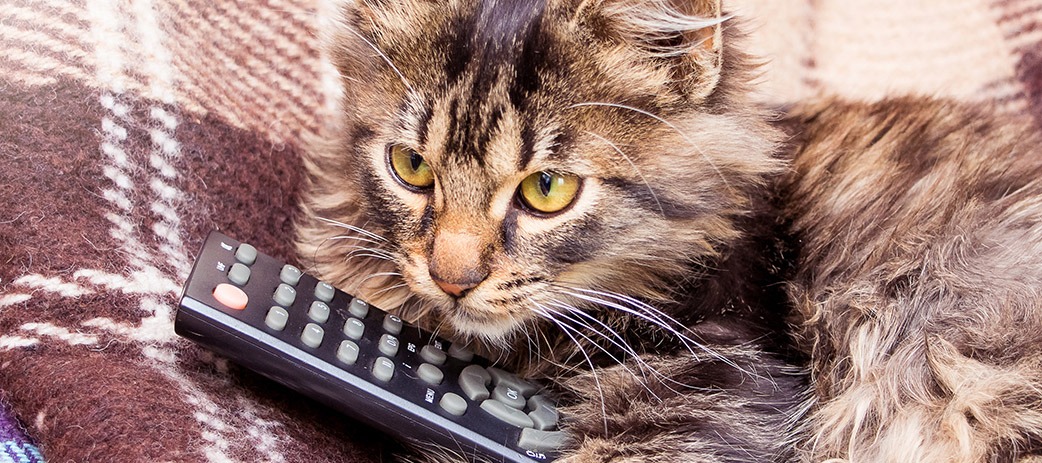It’s an all-too-familiar scenario: You’re cuddled up on the couch, deep into the latest set of David Attenborough documentaries, when suddenly your cat comes careening out of nowhere like the end of the world is upon us.
Amidst darting eyes, meowing at the screen, and possibly even swatting, you may be wondering what’s really happening when they get caught up in the content on TV. Are they scared? Excited? Angry? In short, do they love it or hate it?
Cats are complicated little critters, and their behaviours can sometimes be difficult to interpret. Luckily, we’ve got the lowdown on what really goes on in your cat’s head “behind the screens”.
Understanding your cat's favourite content
You may think cats will respond to whatever happens to be playing on TV, but studies show that cats actually have preferred content types and even preferred TVs!
Unsurprisingly, their favourite content is nature shows and documentaries that depict smaller animals, while their favourite TVs are newer ones with a higher refresh rate (because the image on the screen changes faster, it mimics real-life movement).
There are countless YouTube channels dedicated to “cat content”, with most of them including footage of squirrels, birds, mice, and other cats. Some channels even go so far as to promise to relax your cat with soothing sounds and imagery.
But will it actually work?
Studies reveal that cats who have a higher prey-drive will likely be more engaged with nature documentaries. In contrast, outdoor cats who get their stimulation from the outside world and cats with a low prey-drive won’t show as much interest.
When it comes to content eliciting a specific reaction – such as relaxing your cat – there are no studies to back it up.
Just like humans, every cat is different. If you’re curious about how your cat will respond, try playing some content for them and see what happens:
- Relaxing TV for Cats to Watch
- Videos and Sounds for Cats: Garden Birds Extravaganza
- TV For Cats: The Ultimate Cat TV Video
Is TV bad for your cat?
We’ve all heard about how humans should spend less time glued to their screens, but is this also applicable to our feline friends?
According to Dr. Orlando, the biggest danger is physical. If your cat becomes too engrossed in the content and tries to leap or swat at the TV, they could hurt themselves or scratch the TV. In a worst-case scenario, they could even knock the TV over onto themselves. If this is the case with your kitty, ensure they’re never left unsupervised while the TV is on.
Some cats may become frustrated with being “taunted” by prey they can’t catch (this is also why experts recommend against laser pointers for cats) – so if you notice your cat getting frustrated, ensure you play with them using their favourite toy or treat during the program so they can still get the satisfaction of “catching” their prey. If you notice signs of fear or aggression, it may be in your cat’s best interest for you to change the channel.
Experts also agree that watching TV won’t damage your cat’s eyesight, and if it provides a form of engagement and enrichment, TV can even be a good thing!
Why cats watch TV
According to Dr. Jillian Orlando, a veterinary behaviour resident at the North Carolina State University College of Veterinary Medicine, cats who live indoors are the most likely to enjoy TV due to a combination of boredom and being attracted to the quick sounds and movements on screen.
Dr. Nolan Zeide, a veterinarian in Connecticut, USA, agrees that sound waves and frequencies from TV do affect animals – but ultimately, what pets want most is to be with their owners.
If they see you watching TV, they’re more likely to show interest as a way of connecting with you. Isn’t that sweet?
Whether your cat is a certified couch potato or an avid outdoor explorer, we’ve got cover perfectly suited to their lifestyle and your budget! With packages starting from only R77pm, keeping your kitty covered costs less than the price of a pizza each month*. Get a free online quote in under 5 minutes today.
*Dependent on your plan selection. T&Cs apply.



